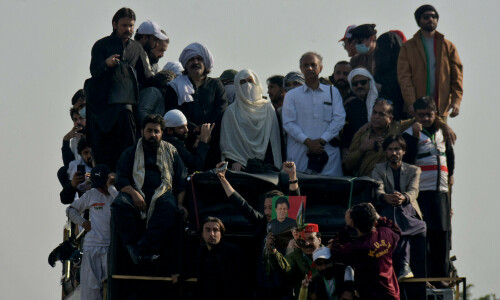MUMBAI, Nov 27: Militants armed with automatic weapons and grenades attacked luxury hotels, hospitals and a famous tourist cafe in Mumbai late on Wednesday, killing at least 125 people.
Following are the questions — and possible answers — about the suspected attackers.
The attacks were claimed by a previously unknown group calling itself the ‘Deccan Mujahideen’ in an email to news organisations.
Deccan Mujahideen’s claim has added to the growing belief that India is confronting a home-grown militancy.
But it is not clear if the claim is genuine, and analysts say the bombings are almost certainly the work of a different group.
The most likely perpetrators, they say, are either the Indian Mujahideen or Lashkar-i-Taiba (LT).
Lashkar-i-Taiba is one of the largest Muslim militant groups in South Asia. But, LT has denied being behind the Mumbai attacks and said it condemned them.
The group was blamed for bomb attacks on markets in New Delhi that killed more than 60 people in 2005, as well as an assault on parliament in 2001 that brought India and Pakistan to the brink of a fourth war.
Indian Mujahideen
Indian police say the Indian Mujahideen is an offshoot of the banned Students’ Islamic Movement of India (SIMI).
The group has been blamed by police for almost every major bomb attack in India, including explosions on commuter trains in Mumbai two years ago that killed 187 people.
In May, the Indian Mujahideen made a specific threat to attack tourist sites in India unless the government stopped supporting the United States in the international arena.
The threat was made in an email claiming responsibility for bomb attacks that killed 63 people in the tourist city of Jaipur. The mail declared “open war against India” and included the serial number of a bicycle used in one of the bombings.
Police authorities said the Indian Mujahideen may also include former members of Bangladeshi militant group Harkat-ul-Jihad al Islami.
The group first emerged during a wave of bombings in the northern state of Uttar Pradesh in November 2007, sending an email to media outlets just before some of the bombs exploded.
They have since claimed responsibility for multiple bomb attacks in Bangalore, Ahmedabad and New Delhi.
The Indian Mujahideen has warned India’s largest-circulated daily The Times of India and other media groups to halt their ‘propaganda war’ against Muslims.
And the group has told Mukesh Ambani, India’s richest businessman, to ‘think twice’ about his construction of a glass-and-steel 27-storey residence on land in Mumbai where a Muslim orphanage once stood.—Agencies













































Dear visitor, the comments section is undergoing an overhaul and will return soon.